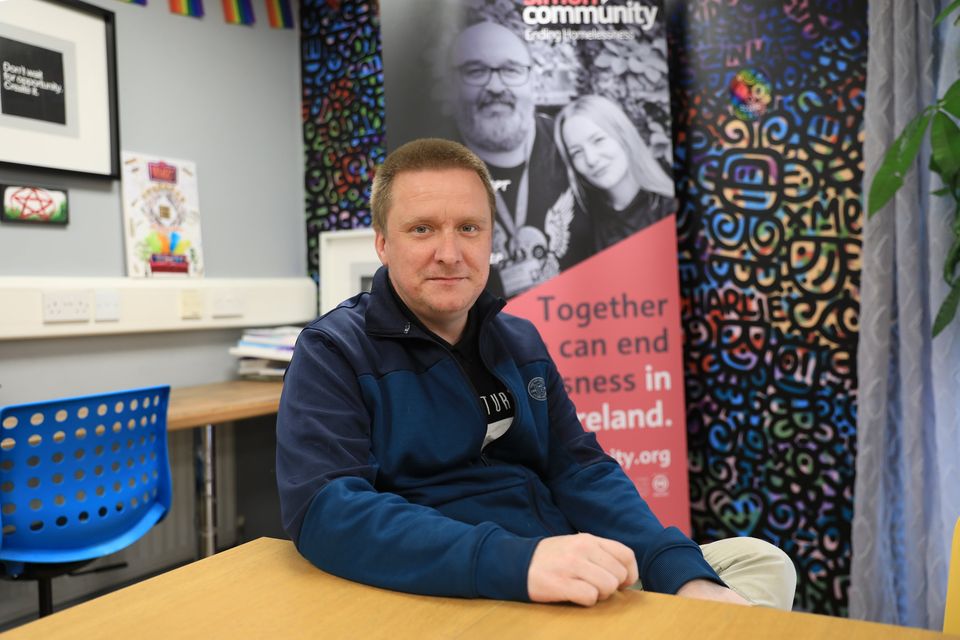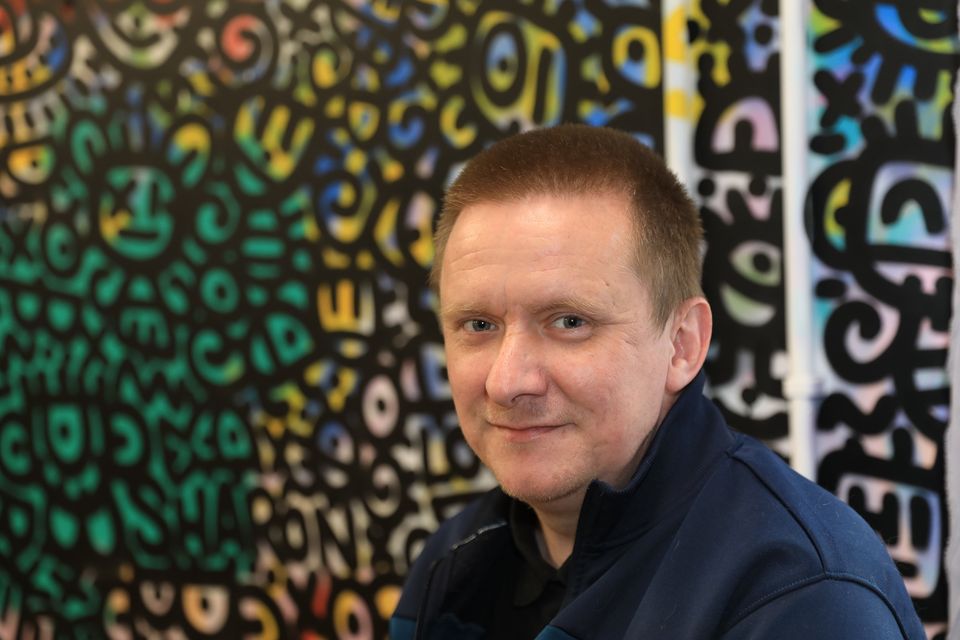Stuart Copeland is now enjoying life in his own home after a life-changing few years.
The Belfast man has spent most of his life caring for others, including family members, and describes himself as the happiest he’s ever been — thanks to the help offered by the Simon Community.
“I always had depression,” he says.
“Even since I was a kid, I always had bouts of it. This is the longest period I’ve ever gone without feeling any depression. Just waking up every morning happy. Everyone who knows me [can see] there’s such a change in me from the past few years.”
Stuart describes 2021 as “catastrophic” and a time when everything “collapsed inward”.
He had previously cared for his grandmother, who had dementia, before her death, and had worked in a nursing home for people with the disease, winning an award for Carer of the Year.
“I left that [job] to look after my mother with dementia. When she died, that’s when everything hit the rails,” he explains.
“She died in April 2021. I was doing great, right up until even the day of the funeral. Everyone was saying they couldn’t understand how I was coping so well. The very next day, I woke up and I was just like ‘My life has no point at all’.”
Stuart Copeland at the Simon Community building on the Malone Road, Belfast (Pic: Peter Morrison)
He had to appeal staying in the house with the Housing Executive and, during the process, didn’t leave his home between April and September 2021.
“I had the blinds closed — complete darkness, completely shut off. My niece used to have to deliver food for me every week.”
When the appeals were unsuccessful, Stuart had to vacate the house and began sofa surfing. He had also been experiencing suicidal thoughts.
Only knowing the Simon Community as being in control of hostels, he began phoning the organisation and, after three days, he was told there was a place in Cliftonville.
“I was that naive that I legit thought it was going to be one big room with bunk beds,” he says.
“The relief when the girl brought me in and said: ‘This will be your room.’ I mean, holy c**p, this is an actual bedroom!
Read more
“The first few months in the Simon Community, I never really left. I only left at night time to go to the shop. It was a wee Co-op down the street. I would go down and get my cola and my biscuits. I wasn’t even eating real food, I was eating biscuits and crisps.
“I was still shut off. I was going through a lot of stuff. I didn’t realise, until I was doing the counselling, all about trauma and stuff.
“During that period, I would be awake at night time and sleep all throughout the day. Because, in my head, I was more relaxed. The anxiety wasn’t that bad when I thought the rest of the world was asleep.”
Stuart was convinced he’d only be allowed to stay in the room for a few days, so he was relieved to hear he could spend a few years there.
“I went from me being in this strange hostel, in a small room, myself still shut off, to ‘Oh, wait, this room is a safe space’,” he says.
“I started opening up and started coming out more. I started talking to the staff a lot more. They helped me with my benefits and everything and sorted me out to get medication — first time I ever got medication for depression and anxiety.
“The change in me over the space of a month… everyone couldn’t believe it.
“I went from being the guy who just walked past the front office and barely mumbled hello to being down in the afternoon joking with them every day and getting on well with them.
“Coming out of that period where, as I say, the answer to every question was suicide, then there’s a scary period of ‘I actually don’t want to die now, but I need to sort my life out’.”
Stuart wasn’t aware of Simon Community’s housing scheme until a staff member explained that the organisation would be his landlord.
To address the chronic lack of affordable housing, Simon Community began purchasing properties through an initiative called ‘Creating Homes’. These properties are offered to people experiencing, or at risk of, homelessness.
To date, it has 22 (owned or sale agreed), with ambitious plans to scale this up over the years to come.
From June 12-19, 2024, there were only 10 available beds out of 463 in Simon Community’s temporary accommodation sites. In the same period, it received 425 requests from people desperate for somewhere to stay.
“To have Simon Community as my landlord, after they were the ones that brought me back and gave me that safety…” he says.
“If you’d asked me a week before I went into Simon Community, ‘What is Simon Community?’, I would have said a couple of hostels. Now it’s become such an important part of my new life.”
Stuart Copeland at the Simon Community building on the Malone Road, Belfast (Pic: Peter Morrison)
Though it took a few months, Stuart was provided a new home in north Belfast, choosing a colour scheme and moving in.
“The first time I went I was buzzing, and [Stuart’s cousin] Nicola [who had experienced homelessness] came with me. She was like ‘You’re a lucky b*****d’. My first night there, I slept like a log.
“The next day, I got my cat brought up and I was just like ‘This is my home now’. And that’s the way it’s felt ever since.
“Being in the hostel, you know in your head that it’s temporary. I think since the Housing Executive phoned me after the funeral, I was constantly living in a mental state of no security. Everything can go on its head at any second.
“I’ve been so happy in that house, but the happiest moment in that house was [one night], at about two o’clock in the morning, my niece was in the back room, playing her games, and laughing the whole night.
“It was just the most comfortable I’ve ever been in my life. It’s my house, my niece is laughing her head off, everyone’s happy, my cats are up sitting proud, this is the good life.”
It feels good to feel good?
“Yeah, it does, and it feels strange as well,” Stuart explains. “I had depression all my life, but it wasn’t like the ‘bad, bad’ one. I thought it was bad until the actual problem.
“Even when I was doing all right, there was always this cloud. I knew it was coming, that there was going to be a period where it was sad. And this is the first time it’s not there — there’s no cloud there, it’s just happy days.
“I had my phone on ‘do not disturb’ for three years. When I was in that house, I used to have near-full-on panic attacks. If my phone even vibrated, I was convinced it was the Housing Executive saying: ‘Right, we’re at the door, get out of the house.’
“Throughout the whole week, I was just an anxiety-ridden mess, until five o’clock on a Friday, when I knew all the places closed, that no one could contact me. So I had Friday night, Saturday night, and then by Sunday the anxiety started building again for Monday.”
He also credits getting his first cat for keeping him busy at the time.
“I ended up having to open the blinds to let some light in for him. I was complaining a lot but really the cat helped me.”
Since moving into his own home, Stuart goes out for walks with a friend, someone who he used to work with in the nursing home and who he calls a sister, a few times a week and is volunteering at a food bank.
“It’s an hour’s walk — that actually does me great. It’s only once a month, but it’s still an hour’s walk. I sleep like a log when I get in because I’m exhausted.
“My walks are one of the best things for my mental health. I put my earphones in, listening to my music, and off I go.”
The idea of giving back is something Stuart’s learned from the Simon Community.
The official homeless statistics for Northern Ireland currently stand at 55,500 people, including 4,500 children, but the charity warns that the true scale is significantly under-reported.
“I learned a lot about homelessness, obviously, being in the Simon Community, and how many people are going through it, because I hadn’t a clue,” says Stuart.
There are 55,500 people who are officially classified as homeless — that’s one in every 34 people.
“You’re talking about mental health and homelessness now. It’s brilliant,” says Stuart.
“Everyone’s going through mental health, everyone knows someone who is going through homelessness, and just being able to talk about it was amazing.
“I just literally thought homelessness meant you were in the street, lying down on Castle Street… I didn’t realise it was 55,000 people without a permanent home.”
Stuart’s also writing, with an idea for a novel that deals with homelessness themes, and is attending conferences.
“I’m excited about that,” he says of putting pen to paper.
“That’s another thing about coming out of the depression — being excited about things.
“I went through a period in the Simon Community hostel of getting into hippie stuff, meditating and all this.
“The best thing I learned to do with my mental health was about making myself present — not letting things in the past get to me, because there’s no point, or worrying about things in the future, because, again, there’s no point. You just think about now.
“So instead of feeling sad about stuff, I just think: ‘I’ve got my house. I’ve got my cats. Everything’s going great.’ And that’s where I am mentally.”
Having had a problem with alcohol — something he says he’ll never drink again — Stuart is not only looking after himself but doing “a good job” of it.
“When I first moved into the house, I was buying all this stuff that, in my head, houses have — paintings and things.
“There are times I walk in and I’m like ‘I’m in my house and it’s an actual real house’.
“If I had moved into that house ten years ago, I would have been your stereotypical lone guy — mess everywhere. But it’s spotless and I’ve got my cats running about and it’s an actual nice wee house.”
Founded in 1971, Simon Community was set up to provide a soup run for rough sleepers across Belfast city centre during the early years of the Troubles. More than 50 years later, Simon Community has grown to become Northern Ireland’s largest homeless organisation. For more information on Simon Community, visit simoncommunity.org. The One Big Sleep Out event will take place at Stormont on October 11. Sign up or get more information at simoncommunity.org/get-involved/events/one-big-sleep-out-2024

